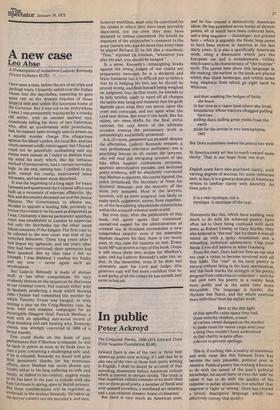A new case
Leo Abse
A Presumption of Innocence Ludovic Kennedy (Victor Gollancz E3.75)
Once upon a time, before the era of air trips and Package tours, I leisurely sailed over the Indian Ocean into the Seychelles, expecting to gain some rest on the dreamy beaches of those tropical isles and within the luxurious home of the Governor. But it was not to be: everywhere I went I was persistently waylayed by a cranky old settler, with an ancient mariner eye, ceaselessly telling his story of two fishermen who, after an involvement with prostitutes, had, he claimed, been wrongly sent to prison on a squalid murder charge. His allegations against the island's police, the local Bar, and the courts seemed wildly extravagant: but I found I could not lie peacefully sunbathing and my swims were uneasy as I failed to dismiss from my mind his story which, like his tortuous method of presentation, had a certain surrealist logic. In the end, cursing him, I yielded to my guilt, visited the courts, interviewed some witnesses, and became more disturbed.
It was the beginning of a long saga: for years I pressed and questioned the Colonial office and built up a mountain of relevant affidavits. My files and documents drowned me and the junior Minister. The Government, to silence me, decided to appoint a leading Silk, privately to review the evidence: he became as disquieted as I was. Ultimately a special permanent appellate court was established in London to supervise not only the Seychelles but the other small island remnants of the Empire. The first case to be referred to the new court was that of ,my wretched fishermen. Three long years after I had begun my agitation, and ten years after they had been convicted, their sentences had been quashed. But by that time I felt no triumph. I was depleted. I confess my frailty and my vow — never again such an involvement.
But Ludovic Kennedy is made of sterner stuff, or has other compulsions. He very evidently thrives on the injustices he discovers in our criminal courts. Not content either with SO laudably producing a book which showed John Christie had committed the murder for Which Timothy Evans was hanged, or with Wilting a play on the Craig-Bentley case, he now, with rare stamina, campaigns for an incorrigible Glasgow thief, Patrick Meehan, a man with an appalling anti-social record of Shop breaking and safe busting who, Kennedy claims, was wrongly convicted in 1969 of a brutal murder.
Few could doubt on the basis of past Performance that if Meehan is released, he will be back in prison as soon as he finds time to case a joint containing a challenging safe: and, if he is released, Kennedy no doubt will gain little permanent thanks for his strenuous efforts. since Meehan has never shown any loyalty either to his long suffering ex-wife and family, or indeed to his country, eagerly ready as he has been in the past to collude with the East Germans to spring spies in British prisons. Rut these considerations will be regarded as irrelevant to the zealous Kennedy. He takes up the lawyer's stance not the moralist's, and men, however worthless, must only be convicted for the crimes in which they have been provably discovered, not the ones they may have dreamed or indeed committed. He would be impatient of the philosopher's comment to the actor Garrick who had declared that every time he played Richard III he felt like a murderer. "Then," rejoined Dr Johnson, "whenever you play the part, you should be hanged."
In a sense, Kennedy's campaigning books against the erring Judges of our courts are preparatory exercises: he is a declared and brave humanist but it is difficult not to believe that he is hedging his bets lest he should be proved wrong, and finds himself being weighed on Judgment Day. In that event, he intends to be fully briefed, ready to ward off all charges the saints may bring and insistent that his guilt 'depends upon what they can prove, upon the overt and conscious, and not upon what the Lord may divine. But even if this book, like his others, are mere drafts for the final awful exercise, the very terror of the ultimate occasion ensures the preliminary work is painstakingly and artfully presented. It is, of course, presented not pleaded: despite the affectation, Ludovic Kennedy remains a very professional television performer, not a practising lawyer: so all, except the lawyers, who will read this intriguing account of the fake alibis, hesitant confessions, perjuries, spurious identification parades, and doctored police evidence, Will be absolutely convinced that Meehan is innocent, the courts bigoted, the police prejudiced, the Secretary of State for Scotland obdurate, and the majority of the Scots jury bemused. Most of the lawyers, however, will be more sceptical, less likely to make quick judgments, aware, from experience, of the bewildering labyrinthine connections within the schizoid criminal underworld.
But even they, after the publication of this book, will surely agree that continued unreserved respect for the administration of criminal law in Scotland necessitates a new independent enquiry: even if the miserable Meehan deserves his fate, there is too much awry in this case for matters to rest. Every Scots MP will receive a copy of this book. I hope it will move them into action for Meehan's sake: and for Ludovic Kennedy's sake too, so that, in the meantime, even if he does not ultimately meet his Lord and Judge, this generous man will feel more confident that he is not guilty of all the crimes he has nursed, and never acted out.


























 Previous page
Previous page